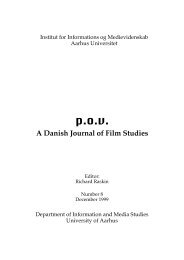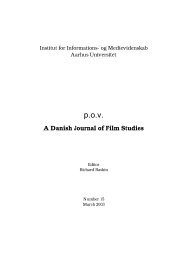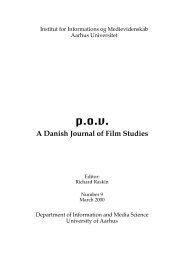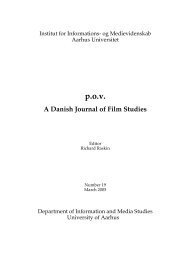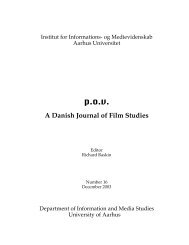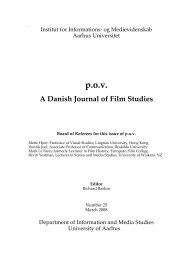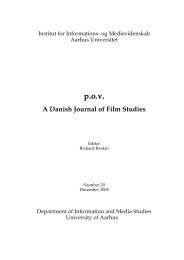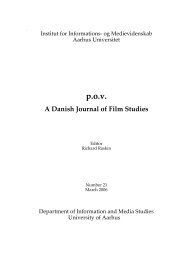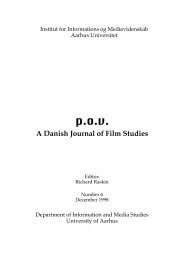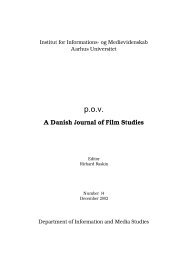The Face of Time - POV - Aarhus Universitet
The Face of Time - POV - Aarhus Universitet
The Face of Time - POV - Aarhus Universitet
Create successful ePaper yourself
Turn your PDF publications into a flip-book with our unique Google optimized e-Paper software.
A Danish Journal <strong>of</strong> Film Studies 115<br />
or causal relations, and 4) the Poetic Narrative Form, which is built<br />
up around visual poetic associations.<br />
<strong>The</strong> point is, <strong>of</strong> course, that the modalities (which structure the<br />
filmed material) involve the spectator in different ways. Bromhead<br />
says that one <strong>of</strong> the ways <strong>of</strong> making the viewer identify with the<br />
characters <strong>of</strong> the story is by using the rules for linear structure:<br />
<strong>The</strong> ideal situation for realising a classic linear narrative<br />
remains the one <strong>of</strong> finding a charismatic personality who is<br />
working towards a goal along a road that is beset by frustrating<br />
obstacles (Bromhead, p. 38).<br />
Thus, it might be helpful to look into the models for fiction already<br />
as you develop the idea, or as you write the script. At any rate you<br />
should consider how to catch the viewer's attention and keep his<br />
interest – and in this connection the modality you choose is<br />
important.<br />
To those who question whether clarity is all that important, I<br />
can only say that it is the most important quality in the making<br />
<strong>of</strong> a film. [...] just as important as clarification, I think, is the<br />
need to simplify. A film director must have a sense <strong>of</strong> simplification.<br />
(François Truffaut, 1985, pp. 17 and 93)<br />
A slogan like "Keep It Simple, Stupid" (K.I.S.S.) (David Mamet: On<br />
Directing Film) applies to the documentary as well.<br />
<br />
<strong>The</strong> camera plays a role: it acts on the sender's (i.e. your) behalf.<br />
Remember that the camera angles and movements are significant<br />
for the degree to which you express respect for, solidarity with,<br />
antipathy against, etc., the people in the film. (In some respects you<br />
always make films about yourself – even though you are working in



